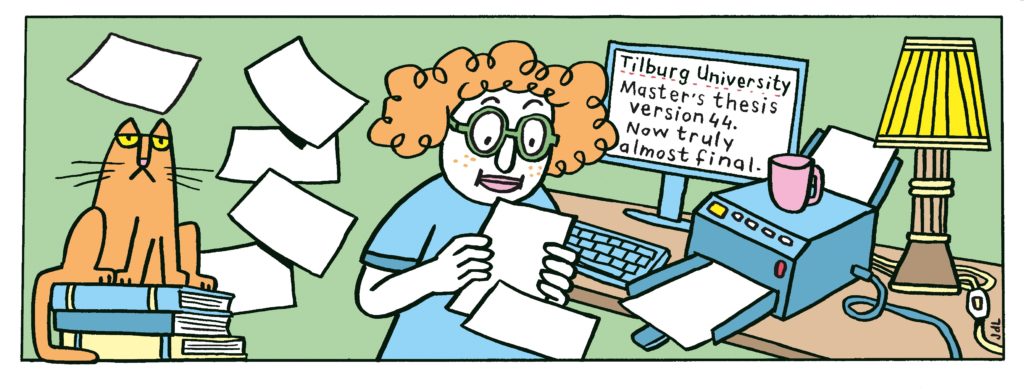Manon Voogt: ‘Where does the dog stay after a divorce? That’s what I wanted to know’
A literature review, experimenting in the lab or working with SPSS? Tilburg University students write the most diverse theses. In the section Master’s Thesis, Univers highlights one every month. This time: five questions to Manon Voogt. She studied Dutch Law and was curious whether a dog can be divided in the same way as a chair or a TV after a divorce.

Where did the inspiration for your thesis topic come from?
“My whole family is extremely fond of my parents’ dog. So, at the kitchen table, just for fun, we have more than once had a theoretical discussion as to whom would get to take dog ‘Boris’ after a possible divorce. Hopefully, that will never happen, of course! You can make visitation arrangements for a child, but what about a dog? Do you divide it, like you divide the household contents? When I was allowed to think of a thesis topic, this question immediately came to mind.”
What have you researched?
“In 2013, the so-called ‘property status’ of the animal was incorporated into the Dutch Civil Code. This is stipulated in Article 3:2a of the Civil Code. This statuary provision is an implication of the Framework Animals Act. But in my opinion, this article is really still in the start-up phase. For one thing, it states that animals ‘are not things’ and thus different from a book, cabinet, or chair. But then it continues that animals may be considered things, subject to various values such as public order and morality.
“I wanted to know whether the wording of Article 3:2a of the Civil Code is sufficiently clear for Dutch case law, and whether the entry into force of this new statuary provision within Dutch property law has actually made a difference in the division of dogs after the breakup of a love affair. By the way, the choice for dogs is not a coincidence because I have a dog myself.

“In fact, research shows that humans and dogs are actually capable of forming an emotional bond. An owner produces the hormonal substance oxytocin when he or she sees his or her dog. This is not the case with many other animals, which is why my Master’s thesis research does not automatically apply to all (domestic) animals, such as a goldfish or budgerigar.”
How did you handle that?
“I did three things. First, I looked at the intent of the legislature. What was the legislature’s rationale in producing and enacting this new statuary provision? The Framework Animals Act is all about recognizing the intrinsic value of an animal. According to that Act, animals should be treated as living sentient beings. When I approach Article 3:2a of the Civil Code from that context, I come to the conclusion that the legislator did not do his/her homework well enough: the wording is too ambivalent.
“In addition, I compared the Dutch statuary provision and its context with that of Belgium. This is because the Belgian legal system has many similarities to ours, including the Civil Code. And finally, I conducted a case law study. Has this new statuary provision led to a difference in case law? Do judges do something different now? Do they take more account of the animal as a living sentient being since 2013?”
What were your most striking observations?
“The increase in court decisions in which the intrinsic value of the dog was taken into account is—statistically speaking—only four percent. This is disappointing because when a new law comes into force, one always hopes for a greater social impact. I am convinced that this is because Article 3:2a of the Civil Code is multi-interpretable, and in actual fact, because of this, there is a great difference in the way different judges rule on the division of estate after the breakup of a love affair.
“In 2016, a judge took into account the stress level of the dog in question. Indeed, the opinion of a dog behaviorist was taken into account. With whom was the dog happiest? This is in contrast to a judge’s consideration in 2014, where the judge took a stricter approach and equated the dog with a book, closet, or TV. After all, the dog was considered ‘goods’ and, therefore, had to be attributed to whoever had ownership over the animal in question. Two similar situations, but both with totally different considerations and outcomes.
“In short: the underlying Framework Animals Act is a good development to recognize the intrinsic value of the animal more. But that’s not the end of it. Because of the multi-interpretable wording, the recognition of rights for animals in the Netherlands is still in its infancy. In Belgium, they are a lot further ahead, where it was recently established that animals are more than things, and that they have sensitivities and biological needs.”
Do you have a tip for upcoming thesis writers?
“When I told people at home what thesis I was going to write, my father said, ‘Isn’t that a little childish for a Master’s thesis?’ But I think you should always choose a topic that is close to your heart and that you are personally involved in, especially because it is your Master’s thesis. You don’t want to end your hard work of the past four years with a boring topic that you don’t even remember later, do you?”
Translated by Language Center, Riet Bettonviel






